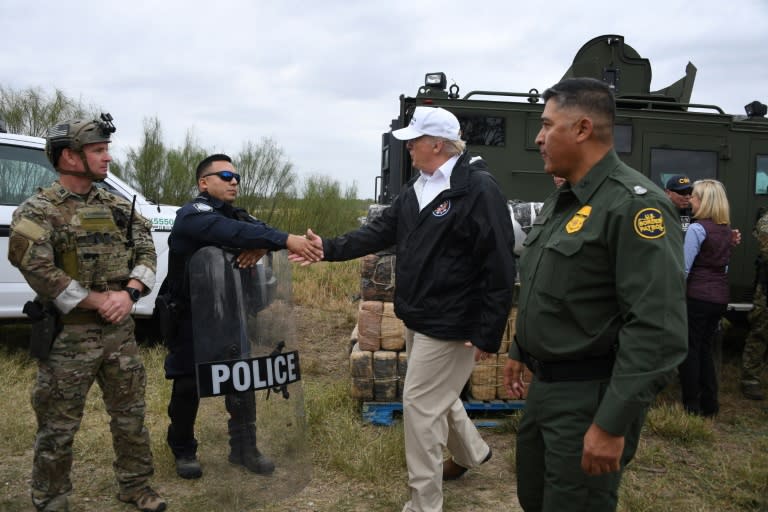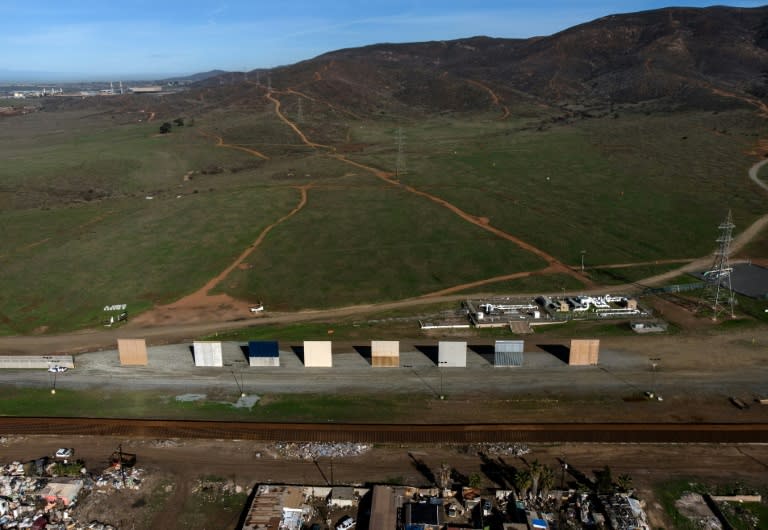Trump nears emergency declaration as US govt shutdown hits 21 days
FBI agents and air traffic controllers were among 800,000 federal workers left unpaid Friday after a US government shutdown sparked by Donald Trump's controversial Mexico border wall plan neared record length, bringing the president to the verge of declaring a national emergency. Trump's demand for $5.7 billion to fund border wall construction has morphed from a crowd-pleasing campaign slogan to an epic political fight paralyzing Washington, setting an ominous precedent for the remaining two years of the real estate magnate's troubled first term. He renewed his Twitter barrage Friday, calling the situation on the Mexican border "an invasion" and insisting that without a wall, "our Country cannot be safe. Criminals, Gangs, Human Traffickers, Drugs & so much other big trouble." But unable to persuade opposition Democrats to give him the money, Trump refused three weeks ago to sign off on swaths of unrelated government funding for employees as varied as law enforcement officials and museum staff around the country. On Friday, that partial government shutdown hit the 21-day mark, equaling the record from previous funding freezes and marking the first day in the saga that paychecks failed to appear for many workers. Trump's strategy was to use the shutdown to pressure Congress into giving him the wall money but the Democrats, who control the House of Representatives, haven't budged, saying they won't even discuss wall funding before government is fully reopened. The impasse leaves Trump with few options other than to relent or to declare a national emergency on the Mexican border, giving himself authority to bypass Congress and order wall funds to be squeezed from other budgets. He appears close to taking the second option, which opponents say will be immediately challenged in court as a case of presidential overreach. On Thursday, Trump took his message to the Texas border with Mexico and insisted once more that he has "the absolute right to declare a national emergency." And the top Senate Republican, Lindsey Graham, tweeted that it was "Time for President @realDonaldTrump to use emergency powers to build Wall/Barrier." "I hope it works," he added. In preparation for the possible emergency move, the White House has asked the military to look into diverting funds currently allocated for disaster relief to the wall, US media reported -- a move that would heighten the polemic. - Battle of egos - The standoff has turned into a test of political ego, particularly for Trump, who came into office boasting of his dealmaking powers and making an aggressive border policy the keystone of his nationalist agenda. Democrats, meanwhile, seem determined at all costs to prevent a president who relishes campaign rally chants of "build the wall!" from getting a win. Both Democrats and Republicans agree that the US-Mexican frontier presents major challenges, ranging from the hyper-violent Mexican drug trade to the plight of asylum seekers and poor migrants seeking new lives in the world's richest country. There's also little debate that border walls are needed: about a third of the frontier is already fenced off. But Trump has turned his single-minded push for more walls into a political crusade seen by opponents as a stunt to stoke xenophobia in his right-wing voter base, while willfully ignoring the border's complex realities. Using typically polarizing language, Trump spoke in McAllen, Texas, on Thursday of cross-border criminals pouring into the country to commit murder. "They just go where there's no security and you don't even know the difference between Mexico and the United States," he told a meeting of border patrol officers. "They have women tied up, they have tape over their mouths, electrical tape. "If we had a barrier of any kind, a powerful barrier, whether its steel or concrete... we would stop it cold," Trump said. In fact, widely respected studies show that illegal immigrants generally commit fewer crimes than people born in the United States. Also, while some narcotics do enter the country across remote sections of the border, the majority is sneaked through heavily guarded checkpoints, the government's own Drug Enforcement Administration said in a 2017 report. It said that most smuggling is done "through US ports of entry (POEs) in passenger vehicles with concealed compartments or commingled with legitimate goods on tractor trailers."





